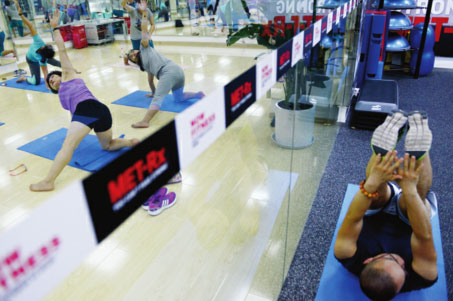Newcomers plan to muscle in on China's gyms
By Sun Xiaochen (China Daily) Updated: 2015-07-22 07:54
|
People work out at 9 pm at NowFitness, a 24-hour club in Beijing. Wei Xiaohao / China Daily |
Hidden agenda
Irrespective of their size, all fitness clubs in China are heavily reliant on sales of lucrative private training courses. The market is highly competitive and low membership fees mean few clubs can make ends meet.
"Gyms always attract customers by offering affordable, discounted membership fees, and then try to make a profit by selling private classes, with prices varying from 300 yuan to 800 yuan an hour," said Han Bing, manager of a branch of Tera Wellness Club in northeastern Beijing.
"Sales assignments are allocated to the trainers, who are forced to practice networking and sales techniques rather than the things they are supposed to do at gyms," Han said.
"Firing trainers because they rank low on the sales list, regardless of their actual training ability, is a sad but normal practice adopted by many clubs nowadays," he said.
Meanwhile, unusual requests from customers, including occasionally over-intimate physical contact, are another headache, and not only for female instructors, according to Han.
"Some female clients asked me to give them a massage while working out. Sometimes it went to a little too far and almost developed into horseplay, which would be unforgivable for a male trainer."
"Staying emotionally close to your clients as a good training companion and sounding board helps to build loyalty, and that benefits your sales, but you must remember to never cross the line."
The recent boom in the fitness industry has resulted in a new problem rearing its head - a massive shortage of qualified trainers.
Yang Bin, the NowFitness owner who started his career as an entry-level trainer, said the key asset for a successful gym, no matter how heavily it has invested in equipment, is always the training team.
"Newcomers enter the industry every day, but clubs are always short of well-trained employees," said Yang, who opened NowFitness in January after working as a personal trainer for more than 10 years. "The use of inexperienced trainers has taken a toll on several hard-won reputations in the business."
A report into China's gym, health and fitness club industry, released in June by the market research organization IBISWorld, estimated that more than 16 million people will visit China's fitness clubs this year.
The report found that approximately 202,025 people are employed as trainers in the nation's 2,322 fitness franchises and private studios, but by the end of 2014 only 15,909 of them had passed the theory and practical tests necessary to be awarded the national fitness trainer certificate issued by GASC's Vocational Skills Assessment Center.
Liu Qingzao, deputy secretary-general of the China Sports Science Society's Sports Industry Commission, said that although several organizations, such as the Asia Academy for Sports & Fitness Professionals in Hong Kong, offer training courses for a large number of trainers, the industry is plagued by unprofessional practices.
"The introduction of a mandatory entry requirement for employees in the fitness and health industry is urgently needed, because the country has set goals to boost the sports industry," Liu said.
Since 2010, GASC's Mass-Fitness Department and Beijing Sport University have jointly organized the annual National Fitness Trainers Convention, which provides a national platform for exchanges related to personalized fitness training, sports science, sports medicine and nutrition, and weight management.
"We expect to help improve the overall standards of fitness instructors, while raising the bar for fitness services in China," Liu Guoyong, director of the department, said.
- Delegation salutes Tibet anniversary
- Officials are told to act as anti-graft watchdogs
- Great Wall safeguarded in united action
- Vice minister pledges more efforts to improve air quality
- Beijing’s efforts to control air pollution start to pay off
- China's military committed to reform
- Netizens rip singer over baby photos
- Central govt's growing support for Tibet
- Monument to be built on Tianjin blast site
- China and Russia seal raft of energy deals








